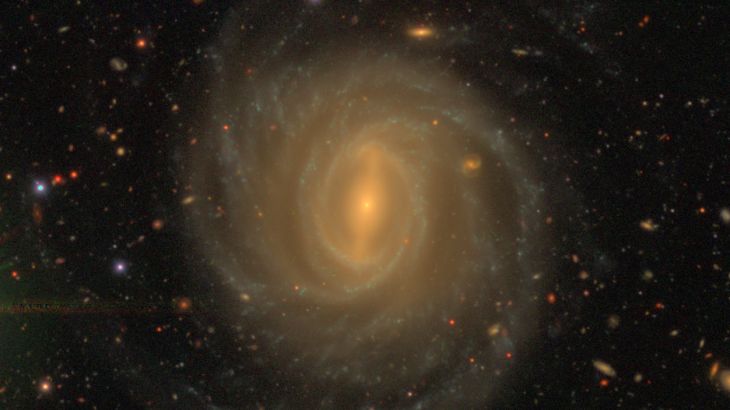
An image taken by the Subaru Telescope of one of more than 3000 galaxies observed by the SAMI Galaxy Survey team. Credit: HSC-SSP/M. Koike/NAOJ
Galaxies start life with their stars rotating in an orderly pattern but in some the motion of stars is more random. Until now, scientists have been uncertain about what causes this – possibly the surrounding environment or the mass of the galaxy itself.
A new study, published in the Monthly Notices of the Royal Astronomical Society, has reported that the most important factor is neither of these things. It shows the tendency of the stars to have random motion is driven mostly by the age of the galaxy – things just get messy over time.
The study’s lead author is Professor Scott Croom from the School of Physics, ARC ASTRO 3D and Sydney Institute for Astronomy.
He said: “When we did the analysis, we found that age, consistently, whichever way we slice or dice it, is always the most important parameter. Once you account for age, there is essentially no environmental trend, and it’s similar for mass.
“If you find a young galaxy it will be rotating, whatever environment it is in, and if you find an old galaxy, it will have more random orbits, whether it’s in a dense environment or a void.”
Updating galactic knowledge
The study updates our understanding from previous studies that have variously suggested environment or mass as more important factors. But the earlier work is not necessarily incorrect, said second author Dr Jesse van de Sande.
Young galaxies are star-forming super-factories, while in older ones, star formation ceases.
“We do know that age is affected by environment. If a galaxy falls into a dense environment, it will tend to shut down the star formation. So, galaxies in denser environments are, on average, older,” Dr van de Sande said.
“The point of our analysis is that it’s not living in dense environments that reduces their spin, it’s the fact that they’re older.”
Our own galaxy, the Milky Way, still has a thin star forming disk, so is still considered a high spin rotational galaxy.
Professor Croom said: “But when we look at the Milky Way in detail, we do see something called the Milky Way thick disk. It’s not dominant, in terms of light, but it is there and those look to be older stars, which may well have been heated from the thin disk at earlier times, or born with more turbulent motion in the early Universe.”
SAMI Galaxy Survey
The research used data from observations made under the SAMI Galaxy Survey. The SAMI instrument was built in 2012 by the University of Sydney and the Anglo-Australian Observatory (now Astralis). SAMI uses the Anglo-Australian Telescope, at Siding Spring Observatory, near Coonabarabran, New South Wales. It has surveyed 3000 galaxies across a large range of environments.







